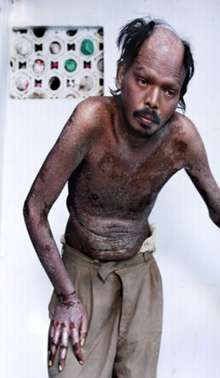On that night, hospital officials frantically called Union Carbide, seeking a treatment protocol. When they finally got through, they were blithely assured that the gas which was killing thousands was “nothing more than a potent tear gas” and that victims merely had to “wash their eyes with water.” In a show of publicity as the bodies stacked up, Carbide flew a series of “top medical experts” to Bhopal to sing a chorus of reassurance. Dr. Hans Weil - reprimanded for unethical conduct by a US court for fudging medical data on behalf of the Johns-Manville corporation - predicted that ‘most victims would fully recover’. Pulmonary specialist Thomas Petty, also flown to Bhopal by Carbide, said that victims were ‘recovering rapidly’. No report made by Carbide-sponsored doctors was made available to the Indian government.
Other ‘expertise’ included Carbide’s Dr. Bipin Awasia, who sent a telex to Bhopal recommending treatment with sodium thiosulphate. When in Bhopal, flanked by lawyers, he said he’d been mistaken. As a result, tens of thousands of ailing victims were denied a treatment that double blind clinical trials had shown to be effective. Success of the treatment would have proven that the gases had crossed into the bloodstream, thus generating more expensive damages against Carbide.
The gas-affected people of Bhopal continue to succumb to injuries sustained during the disaster, dying at the rate of one each day. Treatment protocols are hampered by the company's continuing refusal to share information it holds on the toxic effects of MIC. Both Union Carbide and its new owner Dow Chemical claim the data is a "trade secret" frustrating the efforts of doctors to treat gas-affected victims.
As a result, effective long-term medical treatment has been hampered. Even worse, the effects of the gases on future generations remains unclear even as health effects manifest themselves with disturbing regularity among the children of gas-exposed parents. Since the disaster, the city has been plagued with an epidemic of cancers, menstrual disorders and what one doctor described as "monstrous births.”
In many cases these are the same families who were decimated by the gas in 1984. A whole new generation is being poisoned. People complain of aches and pains, rashes, fevers, eruptions of boils and other skin complaints, headaches, nausea, lack of appetite, dizziness, and constant exhaustion. Lead, mercury and organochlorines have been found in the milk of nursing mothers living near the factory with the result that women are terrified to breast-feed their babies because they are feeding them poison.
Today, more than 23 years after the disaster, Bhopal remains a humanitarian disaster. Their breathless bodies no longer able to push handcarts and lift heavy loads, thousands have fallen into destitution and their families have learned the lessons of the abyss, binding cloths round their middles to give an illusion of fullness, giving children, who are unable to sleep from hunger, water to fill their empty bellies.
Victims of the gas attack eke out a perilous existence; 50,000 Bhopalis can’t work due to their injuries and some can’t even muster the strength to move. The lucky survivors have relatives to look after them; many survivors have no family left. Everyone has perished.

Survivors' organisations have fought back, demanding that clean safe water be piped to the affected communities, that the factory site be decontaminated and the toxins lying there removed, that Union Carbide which abandoned the plant knowing full well the dangers of what it had left behind, should pay for the medical treatment of those who are ill for as long as the illness lasts and that families should be compensated for their years of ill health and loss of earnings.
Union Carbide, which is now a 100%-owned subsidiary of Dow Chemicals refuses to clean up the plant or accept responsibility for the damage it has caused to people's health and livelihoods. It maintains that the state government of Madhya Pradesh should be held responsible. The state government and central governments meanwhile hold Union Carbide responsible for paying for a clean-up.
Survivors campaigning for clean water successfully petitioned the Supreme Court of India, which ordered in May 2004 that clean, safe water be piped into the communities. The state government has, until (about) March 2005 ignored this order. A few tankers of water go into the affected areas, but supplies are sporadic.
Survivors have also filed a Class Action suit against Union Carbide on the issue of contamination and water poisoning in a New York court. The case is currently underway, four attempts by the corporation to have it dismissed have failed.
